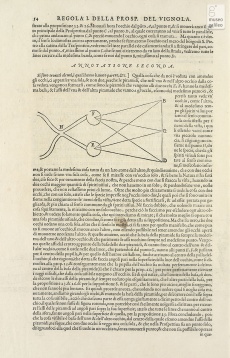Door by Orazio Trigrini de' Marij
From Inventions
Name adopted by Egnazio Danti in reference to Albrecht Dürer’s window.
Contents |
Inventor
Orazio Trigrini de’ Marij
Historic Period
ca. 1580
Description
Variant of Albrecht Dürer’s window illustrated by Egnazio Danti in his commentaries to Vignola’s Le due regole [The two rules] and attributed to Orazio Trigrini de’ Marij. Unlike its model, the “window” and the frame are integral elements placed side by side. Both of the planes, the “window” with the sheet of drawing paper and the frame surrounding the object to be drawn, are traversed by a graduated horizontal ruler sliding parallel to their common base. A string is stretched diagonally across the frame; for each point observed, the painter positions it to intersect the ruler at that particular point. A graduated scale serves to measure the distance of the intersection point from the edge of the frame, and transfer it to the sheet of paper. Proceeding gradually, the image observed through the frame is transferred point by point onto the drawing paper. As Danti notes, the operation of transferring the points by means of the graduated scale has a margin of error that can falsify the final result: “And were it not necessary to be practiced in using this window, I would say it is most excellent. It was demonstrated to me by M. Oratio Trigrini de Marij, who as a man of great ingenuity, one who has always delighted in these most noble professions, has found, along with many other instruments, this “window” as well, which is fabricated double... Practice is necessary, as I have said, because, when the string touches the rule GL, it does not always touch the divisions on it precisely, but sometimes falls on the space between one division and another..."
Bibliographical Resources
Vignola, Giacomo Barozzi da. Le due regole della prospettiva pratica. Con i comentarij del R.P.M. Egnatio Danti. In Roma, per Francesco Zannetti, 1583, p. 58.
Images
Author of the entry: Filippo Camerota

